American Views on Terrorism: 15 Years After 9/11
Research Releases in Culture & Media • September 9, 2016
What is Terrorism?
What counts as terrorism? The contentious term is notoriously difficult to define, and although common threads exist, there is no universal agreement or consensus on its definition. The word first appeared in French (terrorisme) and was used to describe a period of violence in the 1790s following the French Revolution referred to as La Terreur (Reign of Terror). Since then, the term has been deployed in a number of ways, and has come to mean different things to different folks. As the old saying goes: “One man’s terrorist is another man’s freedom fighter.” So what are those common threads?
The research reveals Americans believe terrorism is more than simply an act of violence committed against multiple people, they believe it is not limited to simply an act of violence—that it must also involve a political or religious agenda and be blind to the civilian/combatant distinction. Choosing among several options, the most popular definitions among American adults are made up almost equally between “any act of violence against civilians” (31%), “any illegal or threatening act (violent or not) with a political or religious agenda” (30%) and “an act of violence used to intimidate and/or affect political or religious change” (27%). Less popular is “an act of violence in which multiple people are killed” (12%). The fact that no single definition stands out above the rest exemplifies the complexity of the term.
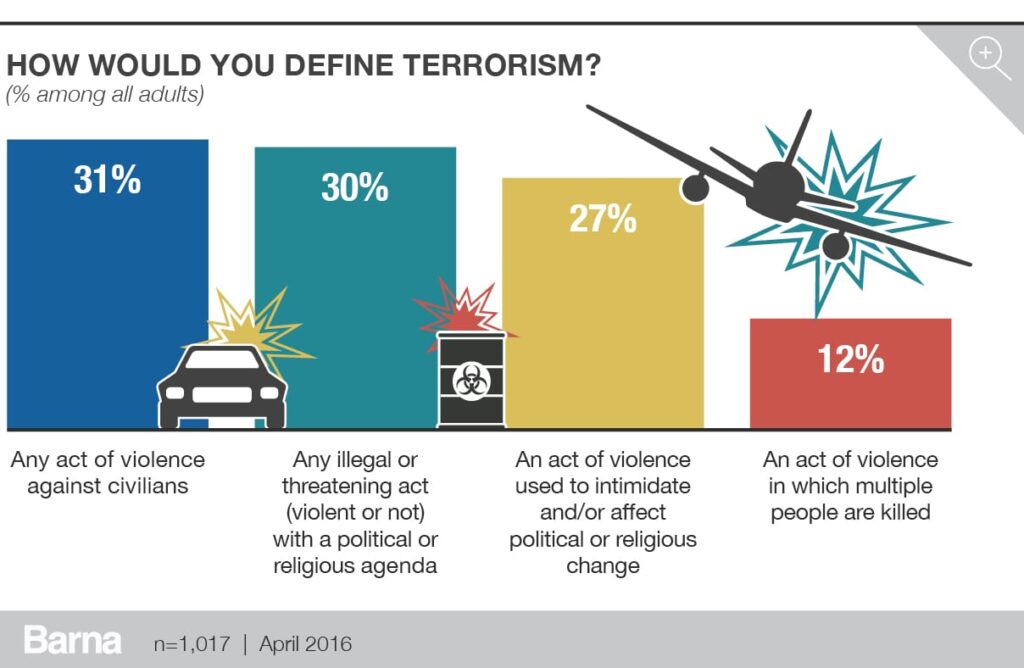
Do Americans Live in Fear of Terror Attacks?
The September 11 attacks claimed almost 3,000 lives, but according to a database maintained by Washington D.C. think tank New America, only 94 people have died in jihadist terrorist attacks on American soil in the 15 years since then (which includes the 49 deaths in Orlando). Needless to say, the odds are fairly low of falling victim to a terrorist attack, and the opinions of the vast majority of American adults reflect this. When asked how likely they think they would be the victim of a terrorist attack, most Americans believe they are either “not really” (52%) or “not at all likely” (20%) to be victims. However, almost a quarter believe it is “somewhat likely” (23%). This is a relatively large number, though perhaps a consequence of recent attacks in both Europe and here in the United States (Orlando, San Bernardino, etc.), bringing the reality of terror attacks much closer to home. Those who believe they are either “extremely likely” (2%) or “very likely” (4%) to be victims of a terrorist attack are small minorities. These responses were fairly consistent across ethnicity, income, religion and ideology.
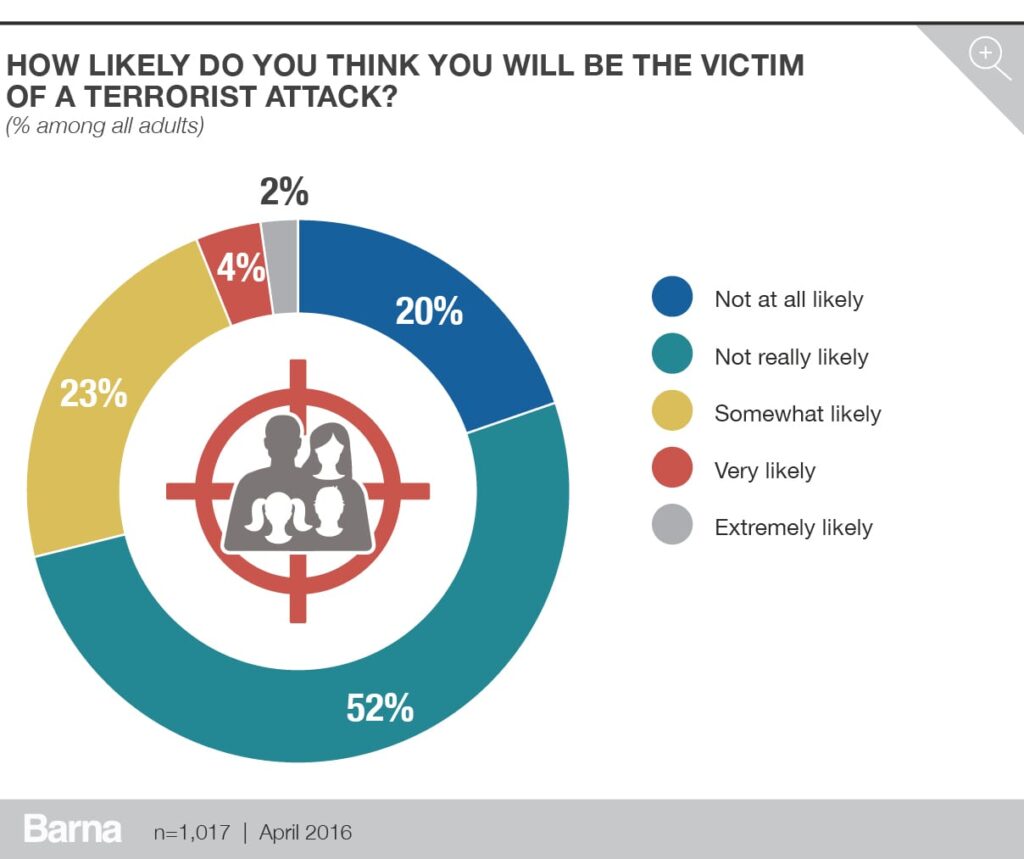
What are the Best Solutions to Terrorism?
The U.S. government response to the 9/11 attacks was swift. The Bush administration declared a “War on Terrorism” which aimed to prevent further attacks and bring Osama bin Laden and al-Qaeda to justice. In October 2001, U.S. military operations began in Afghanistan and the Patriot Act was signed in the same month by George W. Bush. In 2002, the Department of Homeland Security was created and the following year, the U.S. military invaded Iraq. These and other measures, including immigration restrictions, defined the government response to the 9/11 attacks, and continue to dictate policy.
The solution to the threat of terrorism is just as complex as the reality of terrorism itself, so it may come as no surprise that American adults have mixed ideas about how to address it. When asked what they believe is the best solution to the threat of terrorism, the top three responses are a mix of national security, immigration, and foreign policy solutions. The three most popular responses are “greater national security and surveillance/intelligence technologies” (23%), followed by “better foreign policy/better relationship with countries around the world” (19%), and “stricter immigration policies and border control” (18%). Less popular is “fighting poverty and inequality” (10%), “greater efforts toward assimilation and naturalization for immigrants, especially youth” (6%), and “restricting radical religious activities or speech” (2%). Fifteen percent were “not sure” and 7 percent said “other.”
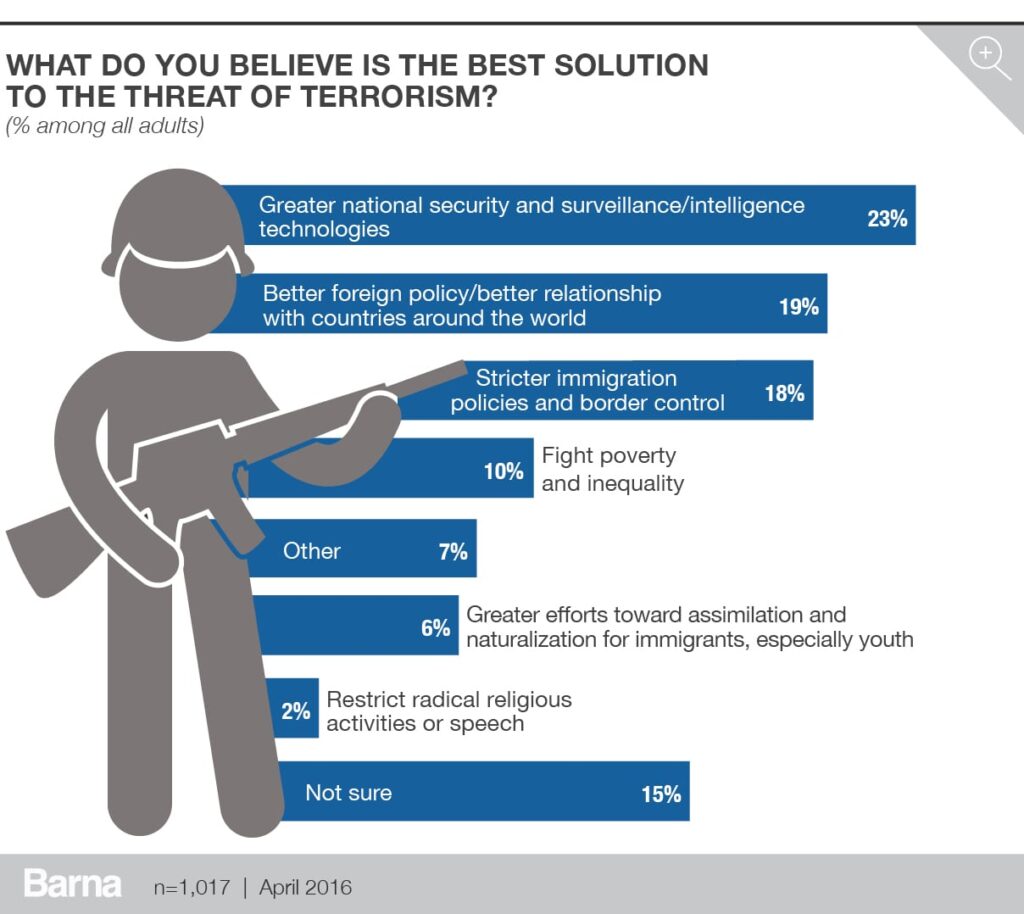
Greater national security and surveillance/intelligence technologies is a popular solution across the board for almost each demographic group. But for the other two solutions, Elders (37%), conservatives (35%), evangelicals (35%), and white Americans (22%) are much more inclined toward stricter immigration policies, while Millennials (33%), liberals (26%), atheists/agnostics (26%) and non-white Americans (24%) are all more interested in better foreign policy/better relationships with countries around the world.
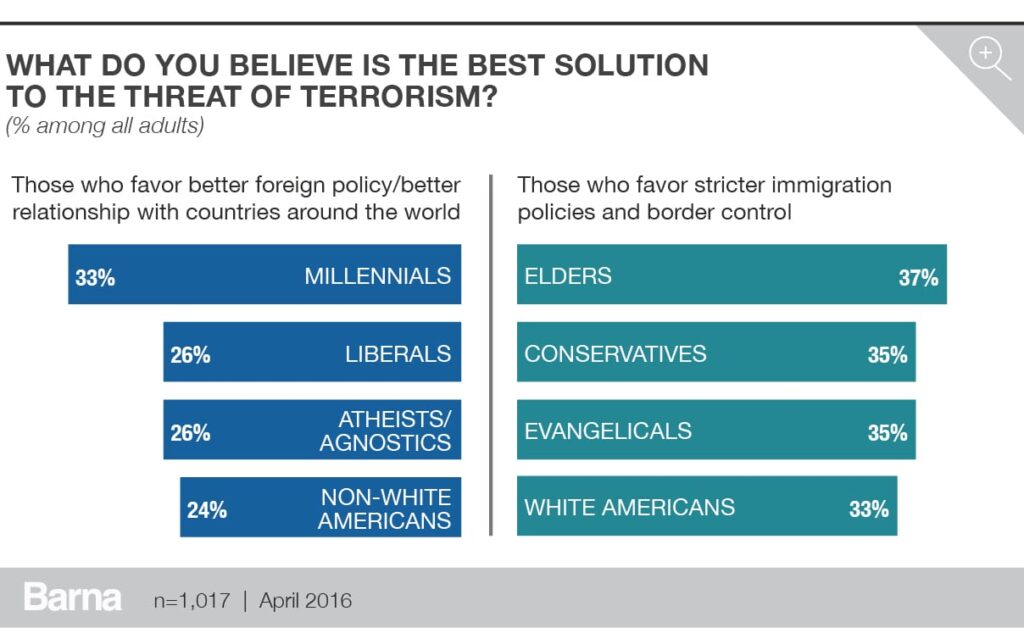
Are Muslims the Perpetrators of Most Terror Attacks?
Some of the more troubling reports after the 9/11 attacks were those related to violence against Muslims. Though George W. Bush was quick to urge his fellow Americans to view Arabs and Muslims living in the United States as American patriots, for some, grief was manifested in anger and violence culminating in hundreds of incidents of anti-Muslim hate-crimes and incidents. Mosques were mobbed, and individuals were attacked across the county. Though the initial anger of 9/11 has slowly subsided, the fact that the attacks, and many more since then (both here and abroad) were conducted in the name of Islam means a strong association for many between Islam and terrorism.
More Americans believe Muslims are the perpetrators of terrorism than not. More than four in 10 American adults (44%) either agree strongly (20%) or somewhat (24%) with the statement: “The majority of terrorism is perpetrated by Muslims.” This is compared to 35 percent who either strongly (16%) or somewhat (19%) disagree with the same statement. One-fifth (21%) are not sure where they stand.
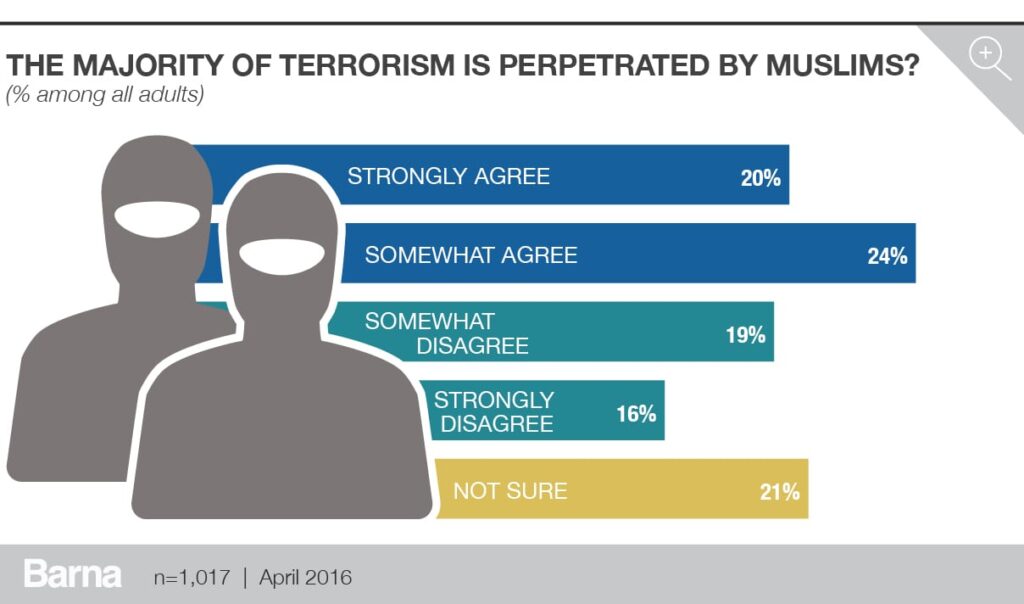
Generationally, Millennials are four times less likely to strongly agree that the majority of terrorism is perpetrated by Muslims than Elders (8% compared to 33%). Strong differences also exist between ethnicities for the same question: 26 percent of white Americans strongly agree that the majority of terrorism is perpetrated by Muslims, compared to lower rates among non-white groups (12% of Black, 9% of Hispanic, and 12% of Asian). Evangelicals and conservatives were among the groups most disposed to believing Muslims are the main perpetrators of terrorism (38% and 40% respectively who strongly agree with the statement), especially compared with those who claim no faith (14%), and liberals (8%).
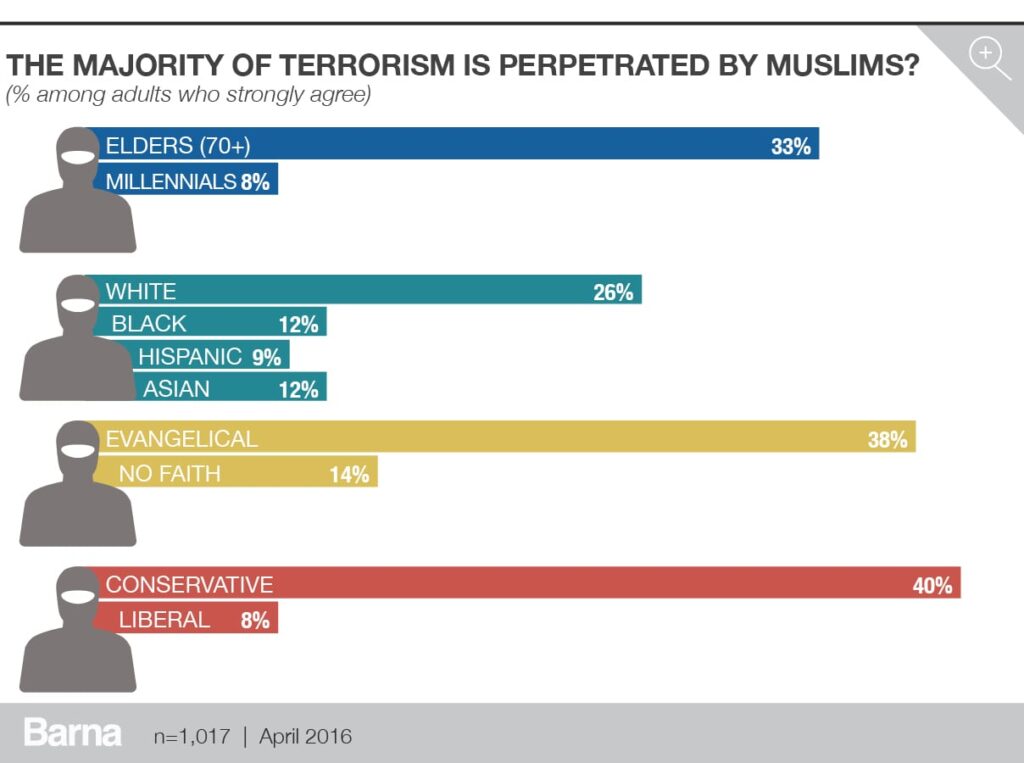
What the Research Means
“Americans across the country will be grieving this weekend for the 15th anniversary of the worst terror attack on American soil,” says Cory Maxwell-Coghlan, senior writer at Barna Group and lead analyst on the study. “As pastors and church leaders stand in front of their congregations this Sunday, it’s vitally important—particularly at a time of great political, racial, and economic division in this country—that the message of hate and disunity be drowned out by the radical gospel message that calls us to love our enemies with grace and love.
“As believers, we must guard against the spirit of fear and distrust that is being stirred up in our current election cycle, and instead do the hard work of peacemaking and reconciliation,” continues Maxwell-Coghlan. “It is clear from the data in this study that much work needs to be done to bridge divides between communities demarcated by race and religion. Christian communities can—and should—take the lead by reaching out to their Muslim neighbors and engaging them through events and conversation.
“September 11 brought us great anguish and pain, but it also brought us together in shared identity and common purpose,” notes Maxwell-Coghlan. “As many face the temptation of prejudice and xenophobia, pastors and church leaders alike must be cultural gatekeepers in one of our most critical cultural moments, urging their congregations and communities to hold fast to the very values that set America apart in the first place, and encourage us all to embrace that old unfaltering truth: ‘United We Stand.’”
Comment on this research and follow our work:
Twitter: @davidkinnaman | @roxyleestone | @barnagroup
Facebook: Barna Group
About the Research
The study on which these findings are based was conducted via online survey from April 7 to April 14, 2016. A total of 1,097 interviews were conducted. The sample error is plus or minus 2.8 percentage points at 95-percent confidence level. The completion rate was 85%.
No faith: identify as agnostic or atheist, or as having no faith
Evangelicals: Have made a personal commitment to Jesus Christ that is still important in their life today and believe that, when they die, they will go to heaven because they have confessed their sins and accepted Jesus Christ as their savior, plus seven other conditions. These conditions include saying their faith is very important in their life today; believing they have a personal responsibility to share their religious beliefs about Christ with non-Christians; believing that Satan exists; believing that Jesus Christ lived a sinless life on earth; asserting that the Bible is accurate in all that it teaches; believing that eternal salvation is possible only through grace, not works; and describing God as the all-knowing, all-powerful, perfect deity who created the universe and still rules it today. Being classified as an evangelical is not dependent upon church attendance or the denominational affiliation of the church attended. Respondents were not asked to describe themselves as “evangelical.”
Millennials: Born between 1984 and 2002
Gen-Xers: Born between 1965 and 1983
Boomers: Born between 1946 and 1964
Elders: Born between 1945 or earlier
Liberal: identify as mostly liberal when it comes to political issues.
Conservative: identify as mostly conservative when it comes to political issues.
About the Barna Group
The Barna Group is a private, non-partisan, for-profit organization under the umbrella of the Issachar Companies. Located in Ventura, California, Barna Group has been conducting and analyzing primary research to understand cultural trends related to values, beliefs, attitudes and behaviors since 1984.
© Barna Group, 2016.
Tidak ada komentar:
Posting Komentar